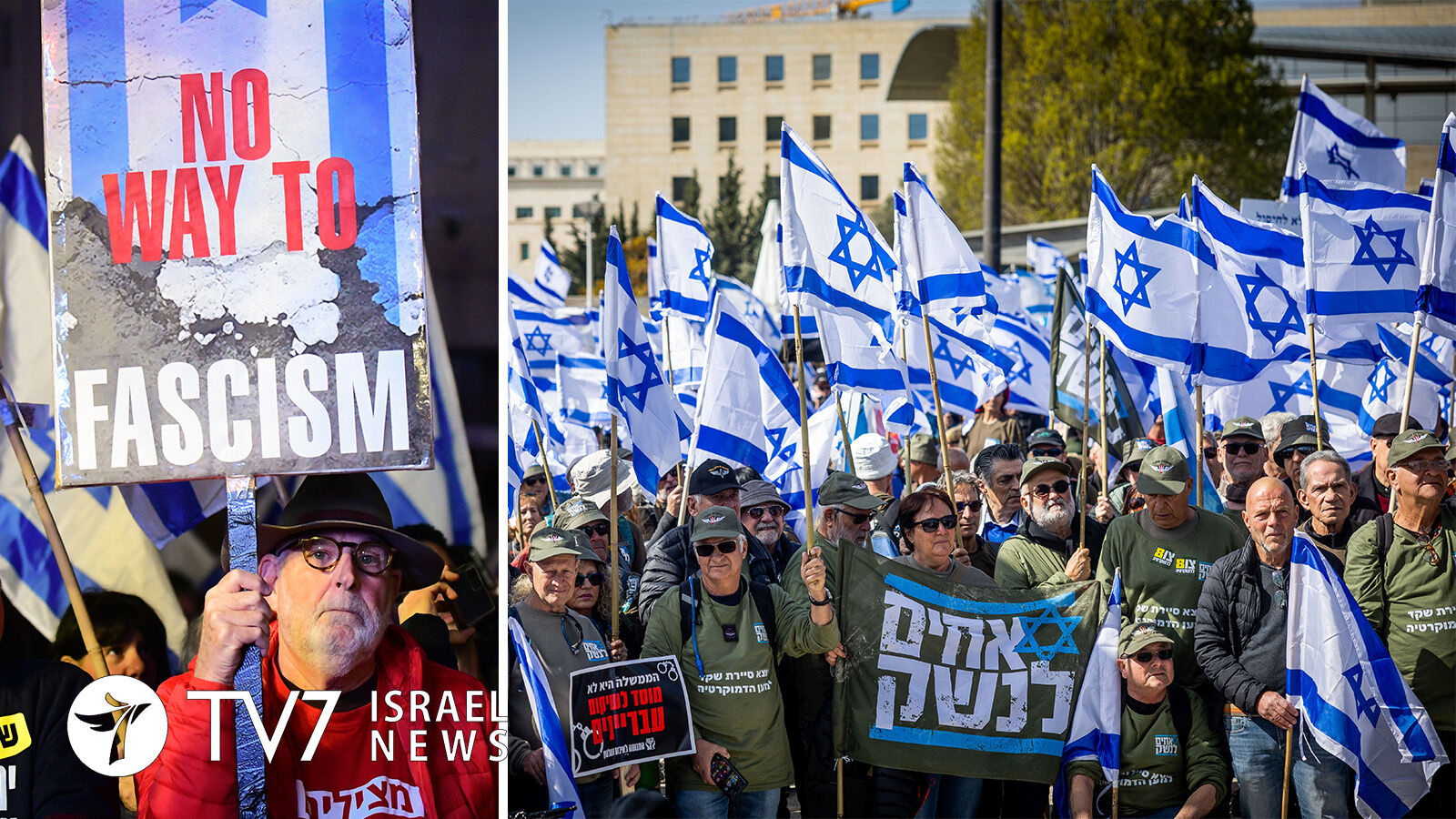Tens of thousands of Israelis demonstrated outside the Knesset today as lawmakers inside formally launched a controversial plan to revise the country’s legal system.
By Erin Viner
Protesters waved a sea of Israeli flags while chanted “democracy,” “’no to dictatorship” and “shame!” in what was the largest protest outside the Knesset in years.
Many traveled cross-country to Jerusalem by trains, buses and private vehicles. Several hundred rallied at the Western Wall in the Old City, the holiest site in Judaism, before making their way to the Knesset.
“We will fight to the end,” vowed Eliad Shraga, who heads the Movement for Quality Government NGO that organized today’s rally. In remarks reported by the local media, he went on to accuse the coalition government of Prime Minister Benjamin Netanyahu of attempting to “change Israel from a liberal democracy to a dictatorship, a fascist dictatorship.”
“I’m protesting for the country my father fought for, my brother fought for, my uncle died for,” said protester Hila Morzehavi, adding, “They fought for Israel to be a democracy, not a fascist’s country.”
Over 250,000 Israelis are estimated to have participated in a separate mega protest in Tel Aviv on Saturday night.
Weekly mass public protests erupted after announcement by Israeli Justice Minister Yariv Levin of a sweeping “reform of governance” that will limit Supreme Court rulings against government moves or Knesset laws, while increasing politicians’ input over nominations to the bench. The government, which took office this month, insists the changes are necessary to curb overreach by activist judges and will restore balance between the legislative, executive and judiciary.
Israel’s right-wing 37th government is an alliance between the Premier’s Likud party with several smaller religious and hard-right nationalist factions which assert they hold the mandate for sweeping change. Likud politicians have long accused the Supreme Court of being dominated by leftist judges who they say encroach on areas outside their authority for political reasons.
Prime Minister Netanyahu, who is himself on trial on corruption charges which he denies, has dismissed the protests as refusal by leftist adversaries to accept the results of the 1 November’s election which resulted in one of the most right-wing governments in Israel’s history. He has ardently defended the judicial overhaul.
While proponents of the changes say they will restore balance between the legislative, executive and judiciary, critics believe the proposals threaten the country’s democracy. The Court’s defenders say it plays a vital role in holding the government to account in a country that has no formal constitution.
According to a survey published yesterday by the public Kan network, 50% of Israelis oppose the judicial overhaul while only 28% support it.
Among those gathered outside parliament today were thousands IDF reservists and veterans following a three-day march to Jerusalem under the banner of, “Brothers in Arms: The March to Save Democracy.” The 50-kilometer (31 mile) walk, organized by the elite Sayeret Matkal commando unit reservists, included former Mossad Director Tamir Pardo and Major General (Res.) Tal Russo. Last week, 15 former top brass of the Armored Corps signed a statement warning, “the Israeli government’s legislative plan to change the nature of the regime will severely damage the justice system, bring the end of democracy, and bring a dictatorship rule in our country.” Moreover, the senior commanders stressed that the move “could damage the motivation and willingness of the reserves army to mobilize.”
Other protests were held outside schools nationwide.
“We are on the brink of constitutional and social collapse,” President Isaac Herzog said in a rare televised speech last night. Stressing, “I feel – we all feel – that we are barely a moment away from a collision – and even from a violent collision,” he appealed to the coalition to suspend their reform plans. While there was reportedly no response to Herzog’s plea from Netanyahu – it was rejected outright by Justice Minister Levin; as well as Chairman of the Knesset Constitution, Law Justice Committee Simcha Rothman of the Religious Zionist party, who dismissed the presidential call as “an opposition view” aimed at “undermining the government.”
In today’s stormy session ahead of the committee vote, Members of Knesset (MKs) stood on tables, and denounced their adversaries as “fascists” and “traitors.” Several MKs were forcibly evicted from the plenum to shouts of “shame, shame.”
Despite Herzog’s appeal, weeks of mass public outcry – and even a statement of concern from United States President Joe Biden – the Constitution, Justice and Law Committee passed today’s motion in a 9-7 vote to advance the bill to the full parliament for approval in a process expected to take weeks.
The standoff comes amid heightened anxiety over security amid a surge of Palestinian terror attacks that have killed 10 people over the past 17 days.
Emphasizing that his government ran on a ticket promoting the enactment of judicial reform, Prime Minister Netanyahu said he strongly condemned “calls to break the law, for civil rebellion, to intentionally harm the economy, and even use weapons by those who oppose government policy. The government received the confidence of the people in democratic elections ad received a clear mandate from the citizens of Israel. Nobody here can deny this.”
Adding that, “neither can anyone deny the right to demonstrate,” the Israeli leader underscored that “there cannot be calls to violence, to act violently, to call for civil rebellion, to compel people to strike who do not want to do so. This is forbidden.”
Netanyahu further stressed the need for civility in efforts to protect the State of Israel – and to engage in dialogue that can ultimately bring about a desired change in a manner that befits a democracy.
“I am certain that the vast majority of the citizens of Israel, whether they support the reform or not, oppose this extremism and will not allow the country to fall into anarchy. I call on everyone to lower the tone and begin a substantive dialogue. We have one country and together we will safeguard it.”
